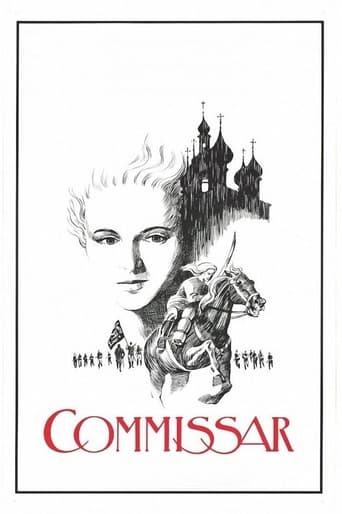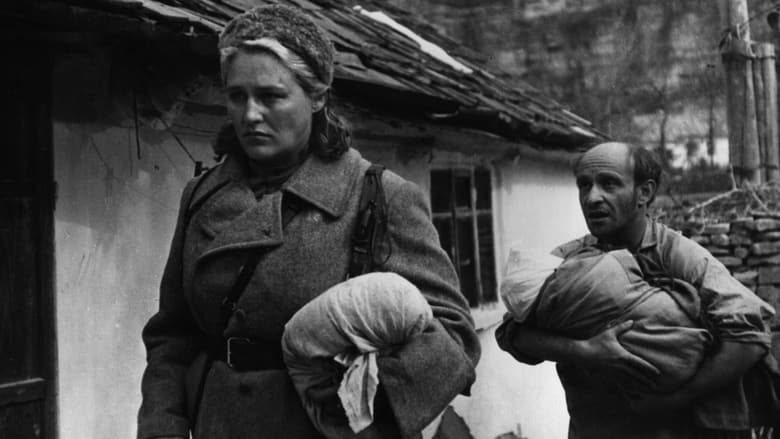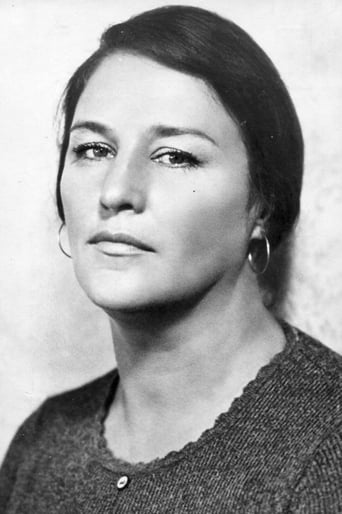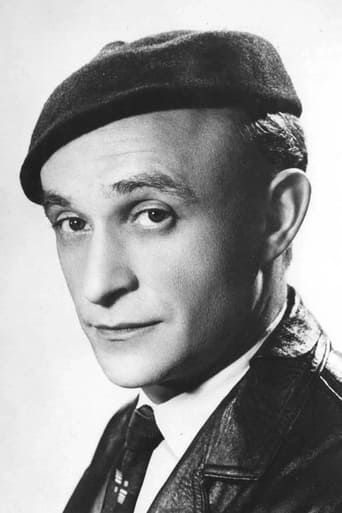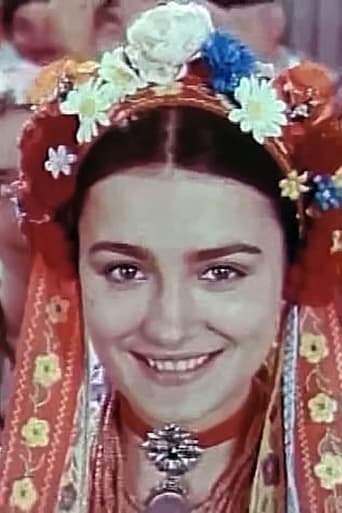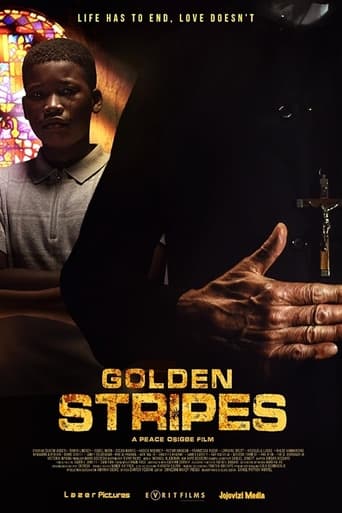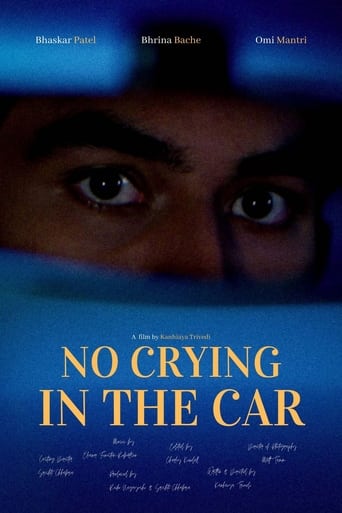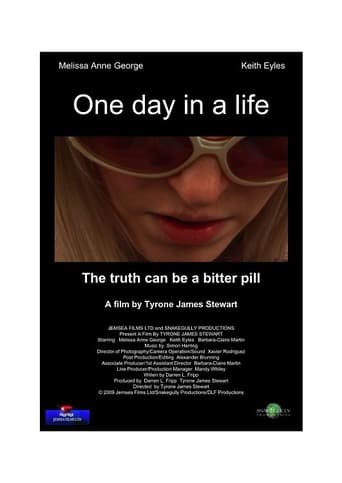The Commissar (1967)
Klavdia Vavilova, a Red Army cavalry commissar, is waylaid by an unexpected pregnancy. She stays with a Jewish family to give birth and is softened somewhat by the experience of family life.
Watch Trailer
Cast


Similar titles
Reviews
I like the storyline of this show,it attract me so much
the audience applauded
Funny, strange, confrontational and subversive, this is one of the most interesting experiences you'll have at the cinema this year.
It’s not bad or unwatchable but despite the amplitude of the spectacle, the end result is underwhelming.
The Russian film Komissar was shown in the U.S. with the translated title The Commissar (1967). It was co-written and directed by Aleksandr Askoldov. This film wasn't released until 1988, 21 years after it was produced. Not only were we deprived of the film, but Aleksandr Askoldov, the director, was never permitted to direct a movie again. The explanation for this delay, and this punishment, was that "the film depicted the Red Army in a negative way." That sounds realistic enough, until you see the movie. To me, the Red Army was depicted in a heroic fashion. There must have been subtle offenses, not clear to a non-Russian.The movie is set in Ukraine, where the Red and White armies clashed in the Russian Civil War. Nonna Mordyukova portrays Klavdia Vavilova, a Red Army commissar, who is fighting against the Whites in the post-revolutionary war. She becomes pregnant, and is billeted with a Jewish family during her pregnancy. Anti-Semitism lies just below the surface of the entire film. Both the Reds and the Whites were guilty of it, although I believe it was worse from the Whites at that time. We don't see actual pogroms during the movie. A synagogue is boarded up when the Whites take over the town, as are many houses. It wasn't clear to me whether these were all houses with Jewish families.However, there's a horrific scene with three of the Jewish children terrify their own sister. They tell her to "come up out of the cellars," and then they "shoot her" with their toy weapons. Obviously, they are playing out a scene that they've witnessed.The acting is outstanding throughout the film. Rolan Bykov plays the husband, Yefim. (It's interesting that Bykov himself was Jewish.) Raisa Nedashkovskaya plays Maria, Yefim's wife. Both Rykov and Nedashkovskaya are excellent actors. Yefim is a strange character--in some ways brave, and in some ways childish. He'd rather dance than work, and he'll break into song when one would least expect it. Maria, his wife, is a more traditional role. The only problem with the casting is that Nedashkovskaya is incredibly beautiful. That would work if she were a young, newly married wife. However, the couple live in poverty, with many children to care for. Beauty doesn't last long in situations like that. Realistically, Maria would be worn down and broken by that point in her life. In the movie, she's still youthful and radiant.The protagonist of the film, Klavdia Vavilova, is a loyal Communist and she is as brave and strong as any man in the movie. In fact, when she's having the baby, and she's told to push, she has a flashback to a moment when she and other soldiers are trying to push a heavy artillery caisson over a hill. As a mother, with a newborn child, she is torn between her baby and her duty to the Red Army. Nonna Mordyukova, who portrays Klavdia Vavilova, was a great Soviet actor. She is excellent in this role. She looks like a strong, tough Ukrainian woman, who would not be out of place in the Red cavalry. Director Askoldov could probably have chosen a young beauty for the role of Klavdia. Instead, he went with an actor with broad shoulders and strong features. Mordyukova inhabits the role, and the movie's greatness is due in large part to her work.We were very fortunate to see this film at Rochester's Dryden Theatre in the George Eastman Museum. The Dryden owns an excellent 35mm print, and seeing it projected on the large screen was a wonderful experience. However, it will work almost as well on a small screen. The Commissar is available on DVD. Don't miss it!
The story and characters are a bit thin; a female leader in the Russian Revolutionary army in 1922 is disgraced when she is found to be pregnant, and goes to live with a Jewish family, loses her hard shell and becomes a mother. But the black and white images are truly striking and impressive, especially the fantasy sequences. They give the story a much deeper power and resonance than it would otherwise have. Especially impressive as a first film. this was suppressed by the Moscow authorities for 20 years for it's sympathetic view of Jews and their oppression in Russia, and the implication that the USSR was complicit in knowing about and not stopping the concentration camps of WW 2.
I was surprised to hear that "Komissar" was filmed in 1967, a year when the USSR was already firmly past Kruschev's thaw and entering the repressive Brezhnev era, because there is something very "thawish" about this film. The general criticism of war, the dignity of ordinary people during a time of calamities, and the juxtaposition of battles with moments of civilian life, all hearken back to the ideas expressed in "The Cranes are Flying" (1956). As in all Soviet cinema, many of the central ideas are expressed through symbolism. This makes the film somewhat difficult for viewers who are not used to this style, but most people tend to find it refreshing and psychologically stimulating. It certainly prompts more post-film discussions than current American cinema that simply shoves the director's point of view down the audience's throat.Some of the themes that I found particularly interesting were: the use of the innocence of children to depict the horror of war, the image of saddled horses without riders galloping into battle, and, of course, the father dancing in the midst of a bomb raid. Most of all, I thought that the change in Vavilova - going from a rough, battle hardened Red Army officer to a nurturing mother, is the most poignant aspect of this film. The scene where Vavilova is hunted my soldiers for having a child mimics her own persecution of a man who leaves the army to be with his beloved. The soldiers turn out to be figments of her imagination, but the point is obvious. However, Vavilova's decision in the end of the film (which I will not reveal for fear of getting blacklisted by the IMDb NKVD) is puzzling in light of the changes in her character. I suppose that Askoldov's opinion that a person's nature cannot be changed by one experience is contrary to my own optimism. Still, I find the end to be somewhat unrealistic.
Adapted from Vasiliy Grossman's novel, "Komissar" (called "The Commissar" in English) was banned for twenty years in the Soviet Union; the censorship board considered it "pro-Zionist" due to its sympathetic portrayal of Jews. It portrays pregnant commissar Klavdia Vavilova (Nonna Mordyukova) staying with an impoverished Jewish family during the 1918-21 civil war. This is the sort of movie that shows the lives of forgotten people in the midst of world events; the father Yefim (Rolan Bykov) complains of how things have not really improved for the Jews since the revolution. I would say that that's something that historians should note.As an FYI, the woman who is teaching the Russian cinema class here in Lewis & Clark College was at the premiere of "The Commissar" in Moscow in 1987.

